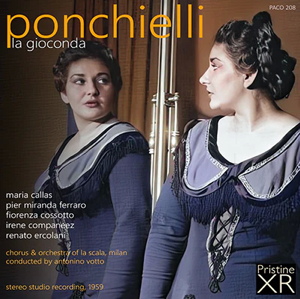
Amilcare Ponchielli (1834-1886)
La gioconda (1876)
Maria Callas (soprano) – La Gioconda; Fiorenza Cossotto (mezzo-soprano) – Laura; Irene Companeez (contralto) – La Cieca; Ivo Vinco (bass) – Alvise; Pier Miranda Ferraro (tenor) – Enzo Grimaldo; Piero Cappuccilli (baritone) – Barnaba
Chorus and Orchestra of La Scala, Milan/Antonino Votto
rec. 1959, Teatro alla Scala, Milan, Italy
Full score, vocal score and Italian libretto available as a download
Pristine Audio PACO208 [166]
My colleague Göran Forsling has already favourably reviewed this issue from Pristine Audio, and it was one of the many recordings I recommended in my 2018 survey of La gioconda, even before it had undergone this sonic refurbishment by Andrew Rose.
I reproduce here an edited version of my findings in that survey:
This recording is by no means perfect or flawlessly cast: better tenors than the stentorian, satisfactory but rather plaintive and unvaryingly toned Pier Miranda Ferraro have tackled Enzo Grimaldo and Piero Cappuccilli, at the beginning of his considerable career, displays his trademark qualities of even, long-breathed phrasing and rather bland characterisation without much of the bite that a really great Barnaba like Milnes, Merrill, Bastianini or Manuguerra – yes, Manuguerra – can bring to the role.
But, but, but…we may hear La Divina in perhaps her greatest recorded role partnered by another great singer also at the outset of her career in Fiorenza Cossotto and perhaps conductor Votto’s best outing. There are some great names in the supporting cast: especially the black-voiced bass Ivo Vinco and the rich contralto of Irene Companeez.
I have many times propounded the case that the decline in Callas’ voice was by no means linear and that you may hear her at her superb best supposedly late in her relatively brief glory years. In 1959 her difficulties with Onassis had much the same effect as her spat with Bing when she sang a glorious Medea in Dallas; they spurred her to pour her rage and pain into her singing and the results are clear, with very little of the flap, wobble, sourness or tiredness which could afflict her later singing. She herself considered this her finest recording, declaring, “It’s all there for anyone who cares to understand or wishes to know what I was about.” If you don’t respond to her Gioconda, you don’t like Callas. Try the cat-fight with Laura towards the end of Act II for real goosebump singing – two great voices hurling insults at each other in Ponchielli’s version of the bitchfest which made famous the confrontation scene between the queens in Donizetti’s Maria Stuarda. Both deploy their shining top and massive lower register to spine-tingling effect, leaning into some of the most melodramatic text ever provided to a composer:
“Ed io l’amo siccome il leone
ama il sangue ed il turbine il volo
e la folgor le vette, e l’alcione
le voragini, e l’aquila il sol!”
[And I love him as the lion loves blood, the whirlwind its flight, the lightning the peaks, the halcyon the whirlpool and the eagle the sun!]
Other singers and recordings are certainly well worth the time and investment but this is still a prime recommendation for Callas alone.
I have no reason to modify my encomium but of course there remains the question of whether Pristine have enhanced the sound of the original EMI release, so I am comparing this with the CD remasters in Warner’s issue of the monster box set La Divina Maria Callas in all her roles. The stereo sound was always very acceptable and in general Andrew Rose does not over-process or “neutralise” old recordings, so there is still some faint background hiss and if you are listening on headphones you may even very faintly hear some noises from outside the theatre – voices, squealing brakes, traffic – but the upper frequencies and La Scala ambience are still intact and there is still a hint of distortion when the chorus is singing con forza as in the opening rumbustious number, “Feste e pane!”, so no-one should complain that the remastering here has sonically filleted the original. What Pristine has done is to “lift” the sound a jot, bestowing greater depth and clarity upon it which, as GF remarks, can also highlight minor flaws – not that I hear much wrong with anything here.
For me, re-listening to this opera in this new release has merely confirmed my love of the music; it is a real voice-maven’s wallow: wonderful tunes, superb voices, heightened drama – sample track 5 of CD 1, and savour the way Callas spits fire and plunges into her lower register in her retorts to Cappuccilli’s suave Barnaba, then Companeez demonstrates what a proper contralto sounds like; then in the next track Leonardo Monreale, in the minor role of Zuàne, caresses the ear with his authentic, Italianate bass – indeed, on his entrance I had to check that I wasn’t hearing Giaiotti or Vinco. Pier Miranda Ferraro might not be the subtlest of tenors, but how we would welcome his presence today and this remastering only reinforces the impact of voices such as his and those of Cossotto and Vinco.
A minor cavil is that Pristine have repeated the error they made in their release of the Callas’ remake of Lucia di Lammermoor recorded the same year and used a picture of her in the role from 1952, before she drastically slimmed down.
Do I urge the prospective purchaser to buy this over the Warner issue? Only if you are a first-time punter or need a new copy – but if you love Grand Opera you need to hear this recording in one form or another.
Ralph Moore
Availability: Pristine ClassicalOther cast
Leonardo Monreale (bass) – Zuane; Carlo Forti (bass) – Cantore, Pilota; Renato Ercolani (tenor) – Isepo, Prima voce lontana; Aldo Biffi (tenor) – Seconda voce lontana; Bonaldo Giaiotti (bass) – Un barnabotto


















